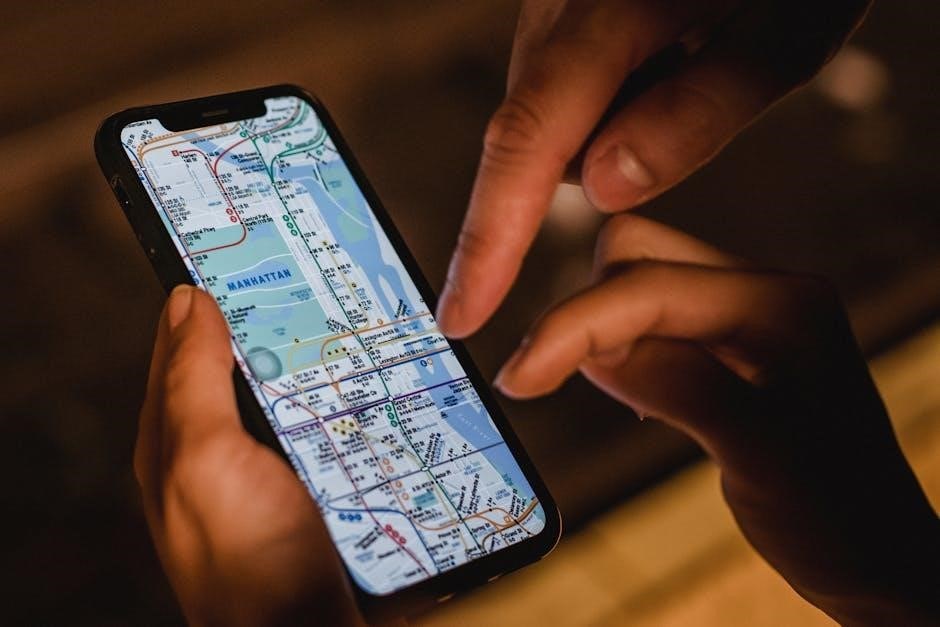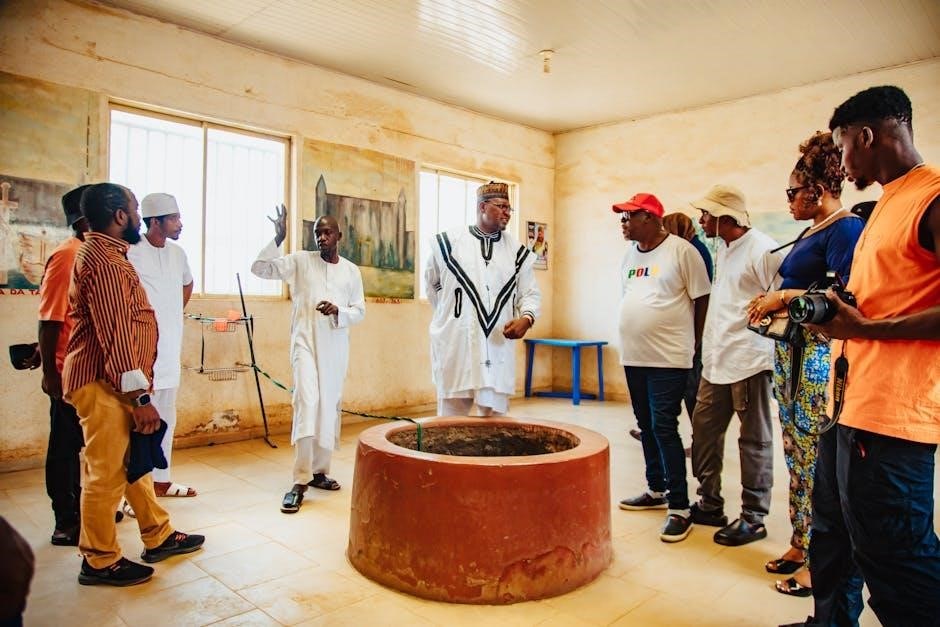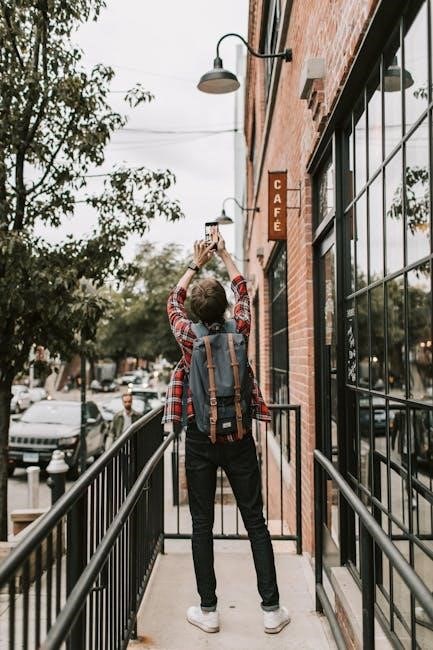Eligibility Requirements for New Orleans Tour Guide Permit
To qualify for a New Orleans tour guide permit, applicants must meet residency requirements, demonstrate financial need for scholarships, pass a background check, and be at least 18 years old.
1.1. Overview of Eligibility Criteria
Eligibility for a New Orleans tour guide permit requires applicants to meet specific criteria, including residency, proof of financial need for scholarships, passing a background check, and clearing a drug test. Applicants must also be at least 18 years old and provide valid identification. These requirements ensure that only qualified individuals can legally operate as tour guides in the city.
1.2. Residency Requirements
Applicants must be residents of Orleans Parish to qualify for a New Orleans tour guide permit. Residency can be verified through a valid state-issued ID, utility bills, or other official documents. This requirement ensures that local knowledge and community ties are prioritized, fostering authentic and informed tours that reflect the city’s unique culture and heritage.
1.3. Financial Need and Scholarship Opportunities
The New Orleans Cultural and Tourism Fund offers scholarships to aspiring tour guides with demonstrated financial need. These scholarships cover full or partial tuition for professional courses. Eligible applicants must meet income criteria and submit required documentation. Applications are accepted periodically, with notifications sent to mailing list subscribers. This initiative aims to diversify the tourism industry while supporting local talent.

Required Documents for Permit Application
A completed application form, valid state-issued ID, and background check are required. Additional documentation may include proof of residency and test results for history and culture knowledge.
2.1. Completed Application Form
The application form must be fully completed and notarized. It is typically submitted online or in person to the Department of Safety and Permits. Ensure all details are accurate, as incomplete or incorrect applications may delay processing. This step is essential for initiating the permit process and must be accompanied by other required documents, such as identification and test results.
2.2. Valid State-Issued Identification
A valid state-issued ID, such as a driver’s license or identification card, is required. This document must be current and not expired to verify the applicant’s identity. It is a fundamental requirement for the permit process and ensures compliance with regulatory standards. The ID must be submitted alongside the application form and other supporting documents for verification purposes.
2.3. Background Check and Drug Test Requirements
All applicants must undergo a federal background check and drug test. The background check includes a review of criminal history through the FBI database. A negative drug test result is mandatory. These requirements ensure public safety and compliance with city regulations. The process typically takes 2-4 weeks, and applicants must schedule their tests at an approved facility designated by the Department of Safety and Permits.
Application Process and Fees
Submit a notarized application, pay the required fee, and complete a federal background check and drug test. Fees cover application processing, background checks, and drug testing, totaling around $300.
3.1. Step-by-Step Application Process
The process begins with obtaining and notarizing the application form, followed by submitting required documents, paying fees, and completing a federal background and drug test. Applicants must then pass a written exam on New Orleans history and culture, achieving a minimum score of 70. Upon successful completion, the permit is issued, granting legal authorization to operate tours within the city.
3.2. Application Fee and Payment Methods
The application fee for the New Orleans tour guide permit is $50, with an additional $60 for the federal background check. Accepted payment methods include Mastercard, Visa, and Discover credit cards. Renewal fees are $60 and must be paid via credit card. Separate fees for the background check are also required, ensuring compliance with city regulations.
3.3. Federal Background Check and Drug Test Fees
A federal background check costs $60, and a mandatory drug test fee applies. Both are required for permit approval. Payment is accepted via credit card, and fingerprinting is done on-site. These fees are non-refundable, even if the application is denied. Applicants must complete these steps before proceeding with the permit process.
Written Test on New Orleans History and Culture
A written test on New Orleans’ history and culture is mandatory, requiring a minimum score of 70 for passage. The test covers key historical events, cultural landmarks, and significant figures.
4.1. Test Format and Content
The written test is mandatory and consists of multiple-choice and short-answer questions. It evaluates knowledge of New Orleans’ history, cultural landmarks, and significant figures. The test is timed, and applicants must score at least 70% to pass. Content covers historical events, cultural traditions, iconic neighborhoods, and key historical figures, ensuring guides can accurately represent the city’s heritage.
4.2. Passing Score and Retest Policy
A minimum score of 70% is required to pass the written test on New Orleans history and culture. Applicants who fail may retest after 30 days. A second failure requires a 60-day wait before retesting. The test focuses on historical facts, cultural landmarks, and key figures, ensuring guides provide accurate and engaging tours. Retesting fees apply, and applicants must wait the specified period before attempting again.
4.3. Verbal Examination and Interview Requirements
Applicants may be required to undergo a verbal examination and interview at the discretion of the Department of Safety and Permits. This assesses communication skills, knowledge of New Orleans history, and the ability to engage tourists effectively. The interview evaluates professionalism and cultural understanding, ensuring guides can provide accurate and captivating tours. This step is optional and based on initial application review.

Training and Educational Programs
Professional tour guiding courses and a Certificate in New Orleans History, Culture, and Tourism are offered, supported by the New Orleans Cultural and Tourism Fund.
5.1. Professional Tour Guiding Courses
Loyola University’s Office of Professional and Continuing Studies offers courses tailored for aspiring tour guides, focusing on New Orleans’ history, culture, and tourism. These courses provide essential skills for leading engaging tours, understanding the city’s heritage, and managing tourist interactions effectively. They are designed to prepare individuals for the permit exam and enhance their professional expertise in the tourism industry.
5.2. Certificate in New Orleans History, Culture, and Tourism
Loyola University offers a Certificate in New Orleans History, Culture, and Tourism, requiring completion of core and elective courses. This program equips aspiring tour guides with deep knowledge of the city’s heritage, ensuring they can lead informative and engaging tours. Scholarships from the New Orleans Tourism and Cultural Fund are available to eligible applicants, supporting their educational journey in the tourism industry.
5.3. Scholarship Opportunities for Aspiring Tour Guides
Scholarships are available for aspiring tour guides through the New Orleans Cultural and Tourism Fund (NOTCF), supporting education in tourism-related courses. Applications open annually, with opportunities for full or partial tuition coverage. These scholarships aim to foster professional growth and enrich the tourism industry by enabling individuals to pursue certifications and enhance their knowledge of New Orleans’ history and culture.

History of Tour Guide Licensing in New Orleans
The history of tour guide licensing in New Orleans is intertwined with the city’s evolution as a major tourist destination, with regulations developing over time to standardize the industry.
6.1. Evolution of Licensing Regulations
The licensing of tour guides in New Orleans has evolved significantly over time, transitioning from informal practices to formal regulations. Early systems were minimal, but as tourism grew, the city established standardized requirements. Key milestones include the implementation of mandatory background checks, written exams, and fees to ensure guides are knowledgeable and qualified. These changes reflect the city’s commitment to maintaining high standards in tourism services.
6.2. Key Milestones in Licensing History
Significant milestones include the city’s formal incorporation in 1718, marking the beginning of regulated tourism activities. The 20th century saw the establishment of formal licensing requirements. Recent updates in 2023 streamlined the process, emphasizing background checks and written exams. These milestones reflect the city’s adaptive approach to managing tourism while preserving its cultural heritage and ensuring visitor safety.
6.3. Impact of Licensing on the Tourism Industry
Licensing has enhanced the professionalism and credibility of tour guides, improving visitor experiences. It ensures guides possess accurate knowledge of the city’s history and culture, contributing to a more authentic tourism experience. While some guides initially resisted the requirements, the system has overall boosted the industry’s reputation, attracting more travelers and supporting local businesses.

Regulations and Compliance
Tour guides must comply with city codes, maintain professional conduct, and adhere to specific rules regarding equipment use and public space access to ensure safe and respectful tours.
7.1. General Regulations for Tour Guides
Tour guides must obtain a valid permit, adhere to city codes, and maintain professional conduct. They are prohibited from obstructing public spaces and must ensure safe and respectful tours. Guides must also follow specific rules regarding voice amplifiers and group sizes to minimize disruptions. Compliance with these regulations ensures a positive experience for both tourists and locals. Proper documentation and adherence to safety protocols are mandatory.
7.2. Specific Rules for Walking Tours
Walking tours must not obstruct pedestrian paths or exceed group size limits. Guides are prohibited from using voice amplifiers and must maintain reasonable noise levels; Tours must avoid restricted areas and respect residential neighborhoods. Guides are required to carry their permit during tours and ensure safe navigation of sidewalks and crosswalks, minimizing disruptions to public flow and local businesses.
7.3. Prohibited Practices and Penalties
Prohibited practices include obstructing pedestrian or vehicular traffic, using voice amplifiers without permits, and conducting unauthorized deviations from approved tour routes. Penalties for non-compliance may include fines, permit suspension, or revocation. Repeated violations can lead to permanent loss of tour guide privileges. Guides must adhere strictly to city regulations to avoid legal consequences and maintain operational integrity.

Benefits of Obtaining a Tour Guide Permit
Obtaining a permit enhances credibility, grants legal authorization to operate tours, and provides access to exclusive training and resources, boosting professionalism in New Orleans’ tourism industry.
8.1. Enhanced Credibility and Professionalism
Obtaining a New Orleans tour guide permit significantly boosts credibility, as it verifies expertise and adherence to city regulations. Licensed guides are viewed as trusted authorities, enhancing professionalism and attracting more clients; The permit distinguishes guides from unlicensed operators, fostering trust and respectability in the tourism industry.
8.2. Access to Exclusive Training and Resources
Licensed tour guides gain access to exclusive training programs, such as Loyola University’s Professional Tour Guiding courses. These resources enhance knowledge of New Orleans’ history, culture, and tourism. Additionally, guides receive updates on industry trends, networking opportunities, and materials to improve tour quality, ensuring they remain informed and competitive in the tourism sector.
8.3. Legal Authorization to Operate Tours
Obtaining a New Orleans tour guide permit grants legal authorization to conduct tours within the city. It ensures compliance with local regulations and allows guides to operate without risk of penalties. The permit is required for all tour activities and must be renewed periodically to maintain legitimacy. Operating without a permit is prohibited and may result in fines or legal action.

Permit Renewal Process
Renewal requires meeting specific criteria, paying renewal fees, and completing continuing education. The process ensures guides remain updated on city regulations and cultural knowledge.
9.1. Renewal Requirements and Timeline
The renewal process for a New Orleans tour guide permit typically occurs every 2-3 years. Applicants must submit updated documents, pass a background check, and pay renewal fees. Continuing education requirements ensure guides stay informed about the city’s history, culture, and safety protocols. Renewal applications must be submitted 30 days before the permit’s expiration to avoid penalties or suspension of privileges.
9.2. Continuing Education and Professional Development
Renewing a New Orleans tour guide permit requires completing continuing education courses. These courses cover updates on the city’s history, cultural landmarks, and safety protocols. Professional development opportunities, such as workshops and seminars, are also available to enhance guiding skills. Many programs are offered by local universities and tourism organizations, ensuring guides stay informed and maintain high professional standards.
9.3. Renewal Fees and Documentation
Renewal of the New Orleans tour guide permit requires payment of a renewal fee and submission of updated documentation. This includes proof of residency, valid identification, and completion of continuing education requirements. Additional fees may apply for background checks or late submissions. All documents must be submitted online or in person by the specified deadline to avoid penalties or permit suspension.

Appeals and Dispute Resolution
Applicants may appeal permit decisions through the Department of Safety and Permits via a written request, outlining the basis for the appeal and supporting documentation.
10.1. Grounds for Appeal
Appeals may be filed based on errors in application processing, disputes over test results, or challenges to background check outcomes. Applicants must provide documented evidence supporting their claim. Grounds for appeal include procedural errors, incorrect permit denial, or extenuating circumstances affecting the application process. The appeal must be submitted in writing within 30 days of the initial decision.
10.2. Procedure for Submitting an Appeal
To submit an appeal, applicants must provide a written request to the Department of Safety and Permits within 30 days of the initial decision. The appeal must include detailed reasons for the challenge and supporting documentation. Submissions can be mailed or delivered in person to the specified office. A formal review process will follow, with outcomes communicated in writing within a designated timeframe.
10.3. Role of the Department of Safety and Permits
The Department of Safety and Permits oversees the tour guide permit process, ensuring compliance with city regulations. It reviews applications, conducts background checks, and processes appeals. The department also enforces licensing rules, resolves disputes, and provides guidance to applicants. Its role is to maintain public safety and uphold the integrity of New Orleans’ tourism industry through fair and consistent enforcement of permit requirements.
Industry Standards and Best Practices
Industry standards for New Orleans tour guides emphasize professionalism, cultural respect, and safety. Best practices include accurate storytelling, maintaining group safety, and promoting environmental sustainability to preserve the city’s heritage.
11.1. Professional Conduct and Ethics
Professional conduct and ethics are vital for New Orleans tour guides. Guides must maintain honesty, respect cultural heritage, and avoid misleading information. They should be punctual, courteous, and ensure a safe environment for all tourists. Adherence to city regulations and ethical standards enhances the credibility of the tourism industry and preserves the city’s unique cultural identity for future generations to enjoy.
11.2. Safety Protocols for Tour Groups
Ensuring the safety of tour groups is a top priority for New Orleans tour guides. Guides must adhere to strict safety protocols, including first aid certification, emergency preparedness, and clear communication. Background checks and drug tests are mandatory to ensure reliability. They must also ensure accessibility for all participants and maintain a safe environment, following all city regulations to protect tourists and staff.
11.3. Environmental and Cultural Responsibility
New Orleans tour guides must uphold environmental and cultural responsibility by minimizing their impact on the city’s heritage and natural surroundings. They are expected to respect historical sites, avoid disruptive behaviors, and promote sustainable tourism practices. Guides should also ensure culturally sensitive narratives, avoid misinformation, and encourage ethical interactions with local communities to preserve New Orleans’ unique cultural identity and environment for future generations.
Impact of Technology on Tour Guiding
Technology enhances tour guiding efficiency through digital tools like apps and virtual reality, offering immersive experiences and real-time information, while social media expands marketing and engagement opportunities.
12.1. Use of Digital Tools for Tour Management
Digital tools streamline tour operations, enabling guides to manage bookings, itineraries, and client communications efficiently. Apps and platforms provide real-time updates, enhancing the tourist experience. GPS tracking and virtual reality offer immersive explorations, while digital platforms facilitate permit applications and marketing, ensuring a seamless and organized approach to tour guiding in New Orleans.
12.2. Online Platforms for Permit Applications
Online platforms simplify the permit application process for New Orleans tour guides. Applicants can submit required documents, pay fees, and complete background checks digitally through official city websites like gtbnola.gov. These platforms offer convenience, transparency, and faster processing times, making it easier to obtain the necessary credentials to operate as a licensed tour guide in the city.
12.3. Role of Social Media in Promoting Tours
Social media platforms play a crucial role in promoting New Orleans tours by enabling guides to share engaging content, interact with potential visitors, and build a community. Platforms like Instagram and Facebook allow guides to showcase the city’s vibrant culture, history, and landmarks, attracting a global audience and driving interest in local tours. This digital outreach enhances visibility and helps guides connect with travelers effectively.





